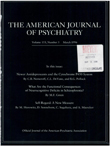Comparison of buprenorphine and methadone in the treatment of opioid dependence
Abstract
OBJECTIVE: This study compared the efficacy of buprenorphine and methadone in the treatment of opioid dependence. METHOD: Participants (N = 164) were relatively treatment-naive, opioid-dependent applicants to a 26-week treatment program who were randomly assigned to either methadone or buprenorphine treatment. Dosing was double-blind and double-dummy. Patients were stabilized on a regimen of either methadone, 50 mg, or buprenorphine, 8 mg, with dose changes possible through week 16 of treatment. Urine samples were collected three times a week, and weekly counseling was provided. RESULTS: Buprenorphine (mean dose = 8.9 mg/day) and methadone (mean dose = 54 mg/day) were equally effective in sustaining retention in treatment, compliance with medication, and counseling regimens. In both groups, 56% of patients remained in treatment through the 16-week flexible dosing period. Overall opioid-positive urine sample rates were 55% and 47% for buprenorphine and methadone groups, respectively; cocaine-positive urine sample rates were 70% and 58%. Evidence was obtained for the effectiveness of dose increases in suppressing opioid, but not cocaine, use among those who received dose increases. CONCLUSIONS: The results of this study provide further support for the utility of buprenorphine as a new medication in the treatment of opioid dependence and demonstrate efficacy equivalent to that of methadone when used during a clinically guided flexible dosing procedure.
Access content
To read the fulltext, please use one of the options below to sign in or purchase access.- Personal login
- Institutional Login
- Sign in via OpenAthens
- Register for access
-
Please login/register if you wish to pair your device and check access availability.
Not a subscriber?
PsychiatryOnline subscription options offer access to the DSM-5 library, books, journals, CME, and patient resources. This all-in-one virtual library provides psychiatrists and mental health professionals with key resources for diagnosis, treatment, research, and professional development.
Need more help? PsychiatryOnline Customer Service may be reached by emailing [email protected] or by calling 800-368-5777 (in the U.S.) or 703-907-7322 (outside the U.S.).



